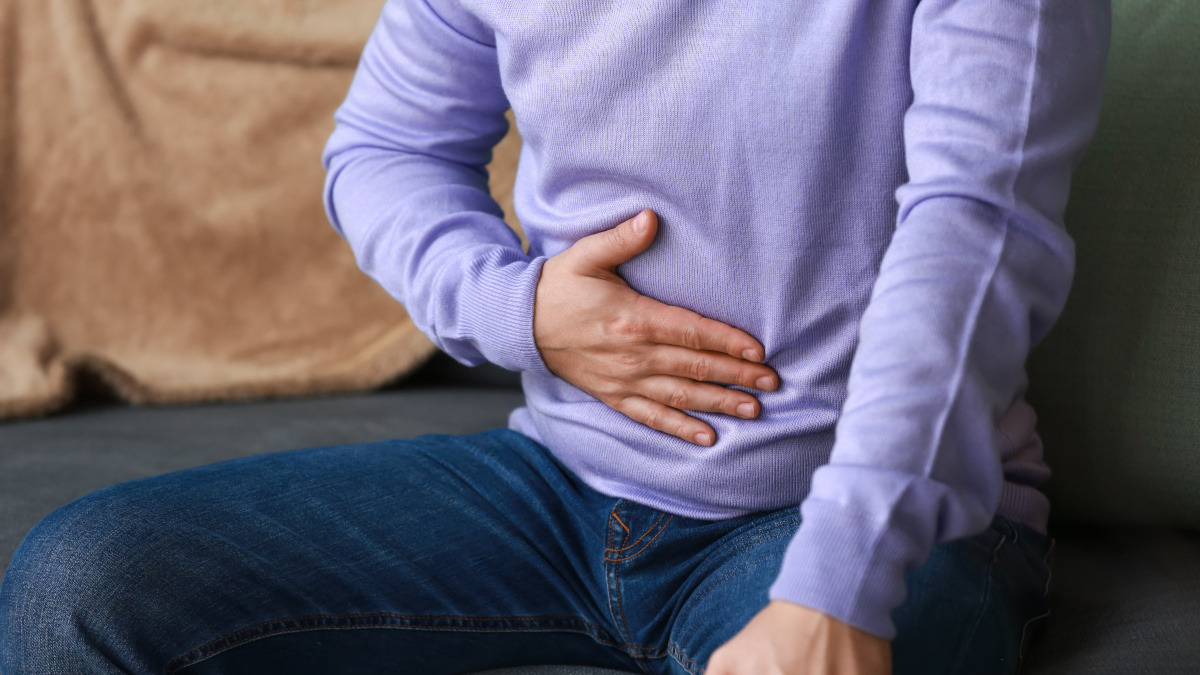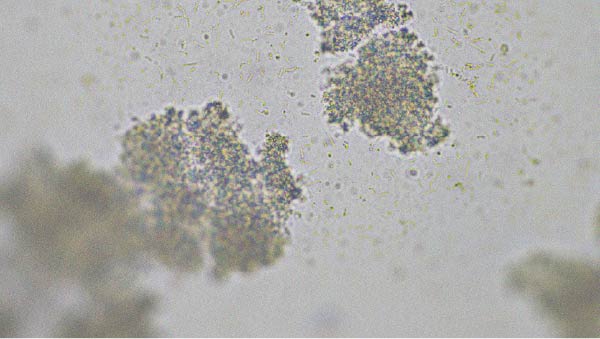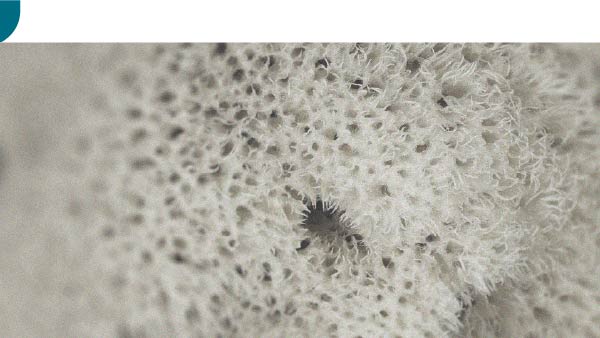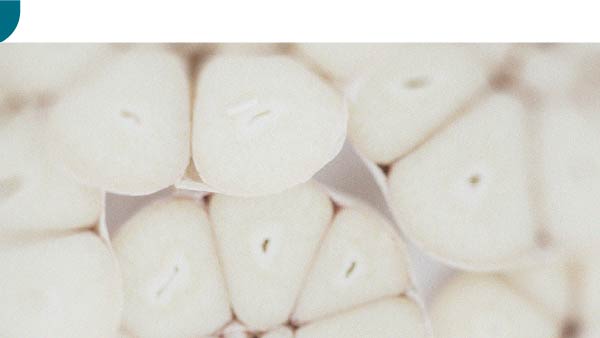How to eliminate intestinal gas naturally?
It’s normal to pass wind around 14 times a day. But the intestinal gas produced in the course of digestion can become a real problem when it’s excessive, foul-smelling or causes bloating. Here’s how to get rid of it.

What causes flatulence?
Bloating, feeling like your stomach’s swollen, nasty-smelling wind: all these non-serious but troublesome symptoms are caused by digestion. The digestive system is a complex, highly effective machine in which each cog (mouth, stomach, small intestine, colon) has its own specific function (1) :
- thus the mouth and intestine perform firstly a mechanical function: ingested food is reduced to a ‘mush’ which encourages consistent, comprehensive enzymatic activity;
- enzymes and gastric juices in the mouth, stomach and liver break down food into elements that the body can absorb;
- villi on the lining of the small intestine enable the nutrients produced by these first stages of digestion to cross the gut wall and enter the bloodstream;
- bacteria in the colon, often referred to as gut flora, complete the process by digesting and dissolving anything
It’s primarily during this last stage that intestinal gas is produced, since as part of the process of dispensing with any superfluous organic matter, fermentation of bacteria occurs in the colon. This fermentation produces potentially malodorous gases: CO2, methane, hydrogen sulphide.
These bacteria-derived gases account for on average 75% of intestinal gas volume (2). The remaining 25% comes from the air we take in when we eat this is called aerophagy (3).
What causes painful intestinal gas?
Potentially painful gas occurs when too much gas accumulates in the colon without being able to escape. This happens for several reasons.
Behaviour and posture
Drinking too many fizzy drinks (which along with gas, also contain sugar which is sometimes poorly digested) and chewing too much gum (which encourages autophagy) have been identified by doctors as a key factor in bloating and excessive flatulence.
Remaining in a sitting position can also cause bloating: working at a desk where you stay seated for hours, before, during and after eating, compresses the abdomen and encourages bloating.
Constipation
Stools, or even blockages, form a ‘bottleneck’ which makes it difficult to pass gas, and causes painful pressure in the abdomen.
Diet
Certain foods are known to be highly fermentable, although the specific polysaccharides responsible have yet to be identified by scientists (4).
The foods primarily to blame are cruciferous vegetables (from the cabbage family), pulses (lentils, chickpeas, split peas, soya, etc.) and red meat. Eating a lot of crudités may also encourage production of gas.
Irritable bowel syndrome (IBS)
Between 5% and 10% of the population may suffer from IBS, according to the French National Institute for Agricultural Research (5).
Behind this umbrella term, lies a diverse range of issues: proliferation of bacteria in the small intestine, disruption to the gut microbiota (which can however be nourished by ingesting the ‘good’ bacteria in probiotics), increased permeability of the intestinal barrier, gut infections, non-coeliac sensitivity to gluten, etc. (6)
Flatulence: various solutions
You need to be aware of all these causes of flatulence so that you can employ the right strategies to combat them. It’s important to identify your particular triggers and then progressively apply measures until you find the right combination of remedies to help get rid of your intestinal gas problem:
Change your dietary habits
This is easy if you know you regularly consume substantial amounts of the foods associated with flatulence, whether foul-smelling or not. The first step is therefore to reduce, bit by bit, or even exclude the foods that may be responsible: fizzy drinks, chewing gum, red meat, eggs, cabbage, pulses, lactose, gluten.
You’ll need to adapt this strategy to your own particular diet: obviously vegetarians may find it hard to exclude pulses from their diet, as their protein intake would then have to come almost exclusively from algae and nuts!
In the same vein, there’s no point following a gluten-free diet (which is particularly restrictive) without first eliminating the foods that are primarily causing your flatulence.
Finally, it may be help to take more exercise and/or sit on an ergonomic chair when working to reduce the time you spend ‘slumped’ over your desk.
Plants good for digestive health
Used for thousands of years in traditional medicine and phytotherapy, certain plants are invaluable for helping to reduce flatulence.
Indeed, grandmothers’ remedies for such problems very often centred around teas and tisanes made from plants such as camomile.
Peppermint is well-known for promoting good digestive tract function and for helping to eliminate digestive discomfort (7). Fenugreek, too, has a similar positive effect on digestion (8).
To benefit from an excellent intake of peppermint and fenugreek (among other useful compounds), a good option is the excellent supplement Digestive Enzymes.
Activated charcoal: a recognised natural remedy
Activated charcoal is a natural remedy recognised by European health authorities and doctors for helping to reduce excessive flatulence after meals (9).
Its use dates back to antiquity when it was recommended by Hippocrates as a way of purifying water. An entirely natural substance, activated charcoal comes from a carbonaceous material such as coconut shells and certain types of wood, which is then activated to increase its porosity and surface area, and consequently, its effect on the gut. When it reaches the intestine, activated charcoal captures molecules of gas or fluid around it: it is thus termed ‘adsorbent’. Activated charcoal can retain up to 100 times its volume in intestinal gas! You could opt, for example, to take Charcoal, an excellent activated charcoal supplement.
A note of caution: as charcoal remains in the body and has an indiscriminate action, it can also ‘adsorb’ certain drugs. It’s therefore important to consult your doctor before taking an activate charcoal supplement if you are on any medication.
So now you have all the information you need to get rid of your intestinal gas naturally.
References
- https://www.vidal.fr/sante/nutrition/corps-aliments/digestion-aliments.html
- Sven Kurbel, Beatrica Kurbel, Aleksandar Včev, Intestinal gases and flatulence: Possible causes of occurrence, Medical Hypotheses, Volume 67, Issue 2, 2006, Pages 235-239, ISSN 0306-9877, https://doi.org/10.1016/j.mehy.2006.01.057
- https://www.vidal.fr/maladies/estomac-intestins/ballonnement-flatulence-aerophagie.html
- Price, K.R., Lewis, J., Wyatt, G.M. and Fenwick, G.R. (1988), Review article Flatulence — Causes, relation to diet and remedies. Nahrung, 32: 609-626. https://doi.org/10.1002/food.19880320626
- https://www.inrae.fr/actualites/syndrome-lintestin-irritable-nouveau-mecanisme-expliquant-douleur-abdominale
- Echinard Flore, « Microbiote et troubles fonctionnels de l’intestin », Hegel, 2016/4 (N° 4), p. 436-439. DOI : 10.3917/heg.064.0436. URL : https://www.cairn.info/revue-hegel-2016-4-page-436.htm
- EFSA Register of Questions - Europa EU
- EFSA Register of Questions - Europa EU
- Jain, N. K.; Patel, V. P.; Pitchumoni, C. S., Efficacy of Activated Charcoal in Reducing Intestinal Gas: A Double--Blind Clinical Trial, American Journal of Gastroenterology (Springer Nature) . Jul1986, Vol. 81 Issue 7, p532-535. 4p. 2 Charts, 2 Graphs.
3 Hours
Just OK
Just OK, ordering from company for many years and being safisfied
Lynn Mae
16 Hours
Recomendo
Produtos encomendados são recebidos atempadamente e de acordo com o anunciado! Muito satisfeita!
Carla Sofia
1 Days
Everything is great!
Everything is great!
Jonas
6 Days
The delivery was fast and the product…
The delivery was fast and the product is great
SOMMARIVA Gianni
7 Days
Great service and lots of information
Great service and lots of information
Gabi
10 Days
Service Satisfaction
I’m satisfied with the service; it fulfilled what it set out to do.
Anfhony Abreu
13 Days
Original product and fast delivery
Original product and fast delivery. I haven't started it yet, but will do soon.
Vincenza Catania
15 Days
Good quality
Good quality. Good service.
Leonel Guzman
18 Days
Top!!!!!!!!
Top!!!!!!!!
Michael
20 Days
Excellent!
Products are great and delivered fast!
PARDINI Debora
20 Days
From order to receive the product
From order to receive the product, the process is smooth & fast. It’s good to customers.
WONG Mei Ling
21 Days
Fast delivery
very quick delivery to italy. product is good.
Customer
22 Days
Prompt delivry !!👍
Prompt delivry !!👍
SWEET Christine
23 Days
Good delivery and flawless quality
AS far as delivery and the visual quality are concerned, Supersmart is excellent. I will not comment on the efficacy of the products themselves, since that is only possible over a longer period and in a large customer base compared to people who do not consume a particular product.
Roger De Backer
24 Days
Perfect services
Perfect services, perfect support, great articles about products
Michaela Alali Beitlová
of experience
your money back
##montant## purchase




